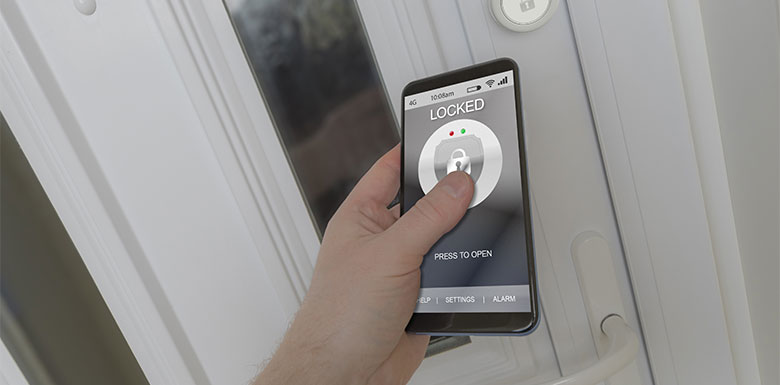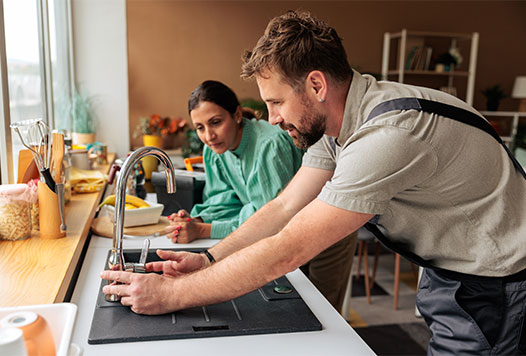What can smart windows and doors do for you?
 In this article
In this article
If you already use smart products, such as a smart speaker or smart heating system, you may be used to using your voice or an app to control appliances and other devices in your home. It’s convenient, gives you the ability to control and monitor things even when you’re out and means you can be alerted to certain situations.
Even if you consider yourself to be a smart home pro, you may not be aware that windows and doors can also be smart – wirelessly connected so that they’re controllable via an app, just like smart light bulbs or heating.
The extra security they offer is currently the main benefit, but the sky’s the limit when it comes to what they might be able to do in the future and you could enhance your business by providing these products.
What are smart windows and doors?
Windows and doors can be made smart by fitting them with smart sensors, locks or mechanisms that can be connected to your home network, usually via a smart hub. This allows them to be operated by an app on your smartphone or tablet. There are also windows and doors with integrated smart systems.
The apps can let you check whether your doors and windows are closed or locked, get reminders to close your windows or doors when you leave your home via geo-fencing (a virtual boundary around your home that’s triggered when you cross it), receive notifications when windows and doors are forced or tampered with and set alarms.
You may also be able to automate actions such as turning on the lights when you get home by triggering them when you open the front door, open and close windows or lock and unlock doors.
Smart window and door systems often work with smart assistants such as Amazon Alexa and Google Assistant, which means you can use your voice to ask whether your front door is locked, for example, or even open a window. You may be able to get notifications via your smart speaker or smart watch as well as your smartphone.
The future of smart windows and doors
The smart functionality is likely to become increasingly advanced. James Attwood, sales director at Which? Trusted Trader L+L Installations, based in Gloucestershire, which currently offers Yale’s SensCheck smart system for windows and doors, says: ‘Biometric locking systems are becoming more readily available, like the fingerprint entry system we offer on the range of Spitfire doors we sell, but you could start to see doors logging comings and goings, such as carers arriving or children coming home from school.
‘Your door could notify you if someone hasn’t left the house for their normal routine in case this means something’s wrong. Or maybe your window will be able to communicate with your heating system and send you a notification that it’s open to avoid heat escaping and energy being wasted.’
Why you should consider offering smart windows and doors
Ownership of smart home devices such as smart speakers and smart video doorbells continues to grow.
According to Statista, the value of the UK smart home market is set to reach £8.4bn in 2024 and grow to £12bn by 2028. You probably know more people who own a smart speaker, such as an Amazon Echo or Google Nest device, than don’t these days and are now used to being faced with a video doorbell when you’re at someone’s front door.
Smart windows and doors are likely to be part of this trend so introducing them to your offering if you’re already working in the industry – or at least selling doors and windows that can easily be made smart in the future – could be a worthwhile move. Many homeowners will be willing to pay more for the enhanced security and functionality of smart windows and doors and the peace of mind they can bring. They may also see them as a wise investment in their home and its security.
‘Even if they’re not made fully smart at the point of manufacture or sale, products should be produced in such a way as to make them ‘smart ready’ to enable easy future integration for the end user,’ recommends James Attwood. ‘This is something we’ve already adopted here at L+L Installations on all our own OPTiMAL brand uPVC products that pass through our manufacturing facility.’
The company also gives customers advice on buying smart devices for their windows and doors, and on fitting them and setting them up, which demystifies a product area that is new to many people. Manufacturers can provide marketing materials and product samples to help you do this.
Looking to the future
Exploring new products and services you can offer as part of your business is one way to futureproof it. As smart windows and doors become more popular, they could give it a major boost. ‘Take a look and be an early adopter,’ advises James Attwood. ‘The world is a connected place and this sort of stuff is coming.’
It’s also worth thinking about how you can make the transition to smart windows and doors hassle-free for your customers. He adds: ‘If you can be as forward thinking as possible with your products with the end user in mind, the simpler it will be for them to enable their products to be smart and the easier it will be for you, the trader.’
There will always be tech-loving consumers who need little persuasion to adopt new technology as soon as it becomes available but, as smart windows and doors become more widespread, more and more people are likely to be convinced of the benefits of installing them.




